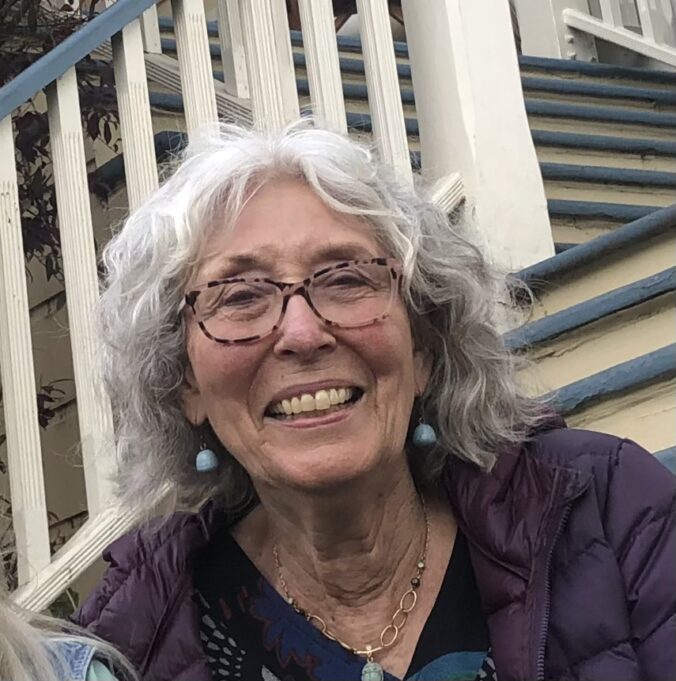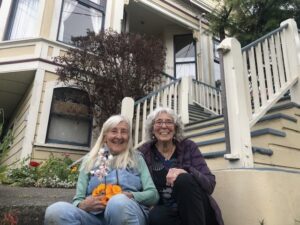I feel as if I’ve been pedaling hard lately—packing up my life, moving from an apartment in a forested Washington-state oasis to a room in a vintage Victorian in a California city. It’s quite different here—though I knew it would be. “Here I am, in my golden years, transplanting myself to a city,” I said to someone recently.
This man had a ready answer. “There are good reasons for living in a city,” he said. “Better medical care, you’re closer to it, and you have a community around you—people who can offer you help.”
That is compelling, I must admit. I haven’t gotten into helping my neighbors yet. I’ve been busy settling in. But I can see that it’s possible, it’s necessary, it’s a really good thing to do, and it’s an excellent reason for being here.
One of the most striking benefits of being in an urban environment is the spectacular variety of people who are here. The thing about South Whidbey Island, where I was living, is that almost everyone is white, almost everyone is old, and—really—most people are female. It is an extraordinarily uniform world. Here in Oakland, walking down any street, in the space of just a few minutes I can hear different languages, see people of all different sorts of nationalities and races, and encounter lots and lots of children.
There is something so refreshing about sharing space with young people. The other day, I was hauling my computer and my big purse with all my IDs several blocks because I had been told—erroneously—that the local Post Office would be able to help me register a photo of my driver’s license with the ID.me website. It was hot, I was getting tired, and when I saw a toddler—maybe three years old—showing her own irritation with her stroller by standing in front of it and crying, I felt emboldened to step in.
“Oh,” I said to her, “so you get to sit in a throne on wheels.” The little girl stopped crying and looked at me; her mother laughed. “She doesn’t want to leave the park,” her mom explained.
“I know how that feels,” I said. “Sometimes I just want to cry, myself.” Her mom and I smiled at each other, and I kept on walking. But I noticed that this lovely, perfectly dressed child had cornrows all over her head, and I wondered just how long it had taken her mother to accomplish all of that. It made me feel quite a bit less critical of my own life.
The woman behind the counter at the Post Office was incredulous when I outlined for her what I’d been told that she would do for me. “Who told you I would do that?” she said. I told her it was a man at the 1-800 number for Social Security, and then I had to admit, “…But it didn’t make much sense to me that you could.” We both started laughing. I packed up my computer and my IDs and trudged home again—and figured it out on my own.
Let me italicize this: I figured it out on my own. I got myself registered online with ID.me, got verified in a video meeting with a young man who was pleased that I was so pleased, and then arranged online to have my Social Security checks direct deposited to a new bank—a bank that’s walking distance from where I’m now living. Success! It was so satisfying!
And then I found my way to Costco, where I bought some fresh Coho salmon and enough toilet paper to last me for a long, long, time,
All of this, and I’m living in a community that is like family to me. Let me illustrate this by recounting a conversation I had with my new next-door neighbor, Aline. She was telling me that she married for the third time a few years ago. Her husband had wanted the wedding to be small, just family. “But my family wouldn’t have been able to come from Canada,” Aline told me. “So, I wanted to ask the people of this community. They’re my family now.”
Her husband asked her who she wanted to invite. “Everyone,” she said. “How could I invite just a few people. That would leave people out… and how can you leave out family!”
I don’t have a good way to end this—except to say that wouldn’t it be nice if we felt that way universally. In the meantime, let’s take care of anyone we think of as family.



Maha, it’s wonderful to hear this update, and to know that you have done it! (And are doing it step by step…) I am truly happy for you, and send all my love.
Yes, dear Maha, it sounds like a very good move, on all accounts! I will be driving up to Oakland a few days after the Intensive which we are offering here on October 12. So I might be in Oakland by October 15 or so. I look forward to seeing you in your new environment with all of your very extended family!!
Love and blessings,
Ganga
Welcome to the neighborhood, Maha! I am so fortunate that you are my neighbor and I get to know you in person after all these years of only knowing OF you!
I agree wholeheartedly with the man you spoke to about the good reasons for living in a city at our age. I’ve lived in 37 different places over the course of my life, and I’m happier here in Oakland, California than I’ve ever been anywhere.
Oh Maha ! How lovely to see you in front of your new home. I’m so glad to have this update. Looking forward very much to staying in touch. Sending love, Joanie xoxoxo
Happy happy landing! Your smile is wide and we enjoy a spot of your new life in Oakland!
xoxox Jan & Rob
Whidbey Island
Lovely to see you on the steps of your new home, Margaret. I admire your equanimity and ability to grow where you’re planted. I will miss seeing you around Langley. I will
enjoy your journey finding/creating home in Oakland vicariously through your blog (I lived there for 30+ years before moving here and loved its vibrancy).
XO Leslie